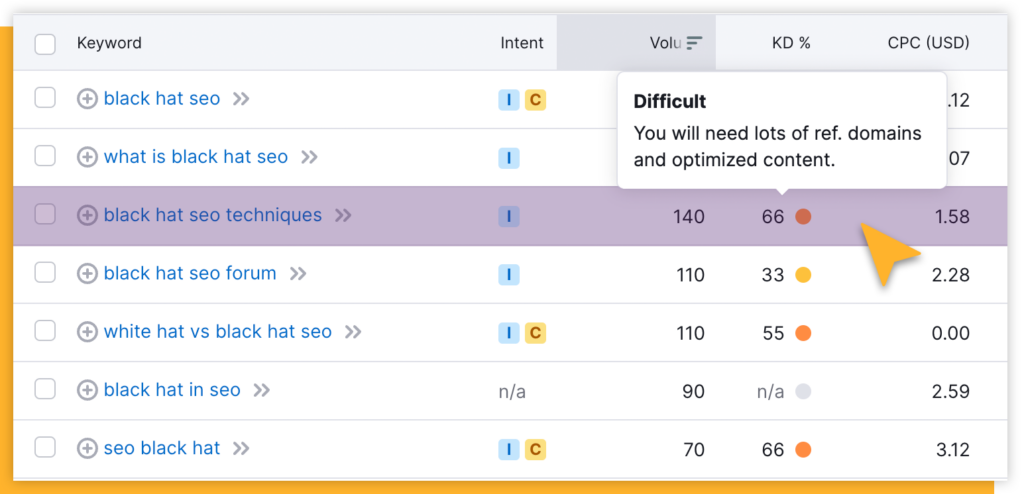Hey there, marketers. Looking to climb your way to the top spots in search engine results? The competition is fierce, and the pressure to achieve higher rankings often leads some down a treacherous path known as Black Hat SEO.
While it may promise quick results, Black Hat search engine optimization techniques go against the principles of ethical and sustainable online marketing practices. In this article, we’ll delve into the world of Black Hat SEO, its tactics, its consequences, and why it’s a road best left untraveled. 🙅
Defining Black Hat SEO
Black Hat SEO refers to a set of unethical techniques that are used to manipulate search engine algorithms and boost a website’s ranking through means that violate the guidelines set by search engines like Google. These tactics are designed to exploit algorithms’ weaknesses temporarily, but they ultimately lead to poor user experiences and often result in severe penalties. So, without further ado, let’s jump into the dos and don’ts. 👇
Common Black Hat SEO Techniques
Keyword Stuffing
Keyword stuffing is a manipulative search engine optimization technique where excessive and irrelevant keywords are crammed into a webpage’s content, meta tags, or hidden sections with the aim of tricking search engines into ranking the page higher for those keywords. The content becomes unnatural and loses its readability, often resulting in a poor user experience. Keyword stuffing attempts to exploit search engine algorithms rather than delivering value to users.
Consequences of Keyword Stuffing
Search Engine Penalties: Major search engines like Google have sophisticated algorithms that detect keyword stuffing easily. In response to this manipulative practice, search engines impose penalties on websites engaging in keyword stuffing, which can lead to significant drops in search rankings or even complete removal from SERPs.
Poor User Experience: Keyword-stuffed content is challenging to read and lacks coherence. Visitors to your website may find it difficult to understand the message you’re trying to convey, leading to high bounce rates and decreased user engagement.
Loss of Credibility: Quality content builds credibility and trust with your audience. Keyword stuffing undermines this credibility, making it challenging to establish a strong online presence and gain your readers’ trust.
Negative Impact on Brand Image: When visitors encounter spammy or low-quality content due to keyword stuffing, it reflects poorly on your brand’s image. A negative first impression can be detrimental to your business’s reputation.
Ineffective SEO Results: Contrary to the intended outcome, keyword stuffing doesn’t guarantee improved SEO results. Search engines prioritize content that is relevant, valuable, and user-friendly. Overusing keywords distracts from the actual message of the content and prevents it from ranking well organically.
Applying Keywords Wisely
To achieve successful SEO, using keywords strategically and responsibly is crucial. Here are some guidelines for incorporating keywords into your content effectively:
Focus on Relevance: Choose keywords directly related to your content’s topic and intent. Align the keywords with the context of your message to create a seamless and engaging reading experience.
Natural Integration: Place keywords naturally within your content, ensuring they flow smoothly and make sense in the context of your writing. Remember, your primary audience is human readers, not search engines.
Use Synonyms and Variations: Rather than repeating the same keyword multiple times, use synonyms and related variations to diversify your content while maintaining its quality and coherence.
Title and Meta Description: Optimize your page’s title and meta description with relevant keywords, but keep them concise and appealing to users to increase click-through rates.
Long-Form Content: If possible, create comprehensive, long-form content that allows for the inclusion of a wider range of relevant keywords without compromising readability.
Keyword volume & difficulty: Be sure to weigh up keyword volume and difficulty correctly. While a higher volume is often better, this usually goes hand-in-hand with higher keyword difficulty, making the game of appearing on Page 1 results that much more competitive. Tools like Semrush can really help here!

Other Black Hat Methods to Avoid
Cloaking: This technique shows different content to search engine bots and human visitors. While search engine bots might see optimized content, users are redirected to unrelated or irrelevant pages, causing a frustrating experience. 😤
Hidden Text and Links: Marketers use hidden text (by making the text the same color as the background) or hidden links to stuff keywords or direct users to other pages. These tactics deceive users and manipulate search engines’ understanding of the page’s content.
Link Farms and Buying Links: Creating or participating in link farms involves creating a network of low-quality websites to link to each other. Buying links from such networks undermines the natural link-building process and can lead to ranking penalties. 😬
Spam Comments and Guest Posting: Posting irrelevant comments on blogs and forums with links back to your site or producing low-quality guest posts to gain backlinks are considered manipulative practices.
Consequences of Black Hat SEO
While Black Hat SEO techniques may yield short-term gains, they carry severe long-term consequences:
Penalties: Search engines continuously update their algorithms to identify and penalize sites using Black Hat techniques. These penalties can lead to significant drops in search rankings or even removal from search results.
Reputation Damage: Engaging in Black Hat practices tarnishes a business’s reputation. Users who experience poor-quality content or deceptive practices will lose trust in the brand. 📉
Loss of Organic Traffic: The very traffic Black Hat tactics aim to attract can vanish overnight due to search engine penalties. Businesses become heavily reliant on paid advertising to maintain visibility.
Investment Loss: Businesses investing in Black Hat techniques will eventually need to redo their SEO efforts using ethical methods, resulting in wasted time, money, and resources. 💸
Conclusion
It may seem tempting to resort to shortcuts like Black Hat SEO to achieve quick results. However, the risks and consequences associated with these techniques far outweigh the temporary gains. Building a strong online presence requires patience, dedication, and adherence to ethical SEO practices.
Instead of chasing after fleeting success, marketers should focus on creating high-quality, valuable content that resonates with their target audience. By implementing White Hat SEO techniques, which prioritize user experience, relevancy, and transparency, businesses can forge a sustainable path toward organic growth and long-term success in the digital landscape.



Join the conversation
1 comment
Oliver Ablesu on Sep 28, 2023 at 1:12 pm
Good
Submit a comment
Your email address will not be published. Required fields are marked *